DUMP-2016: video of all reports in one post. Is free. Without SMS
On April 8, a DUMP conference was held in Yekaterinburg. Under the cut - a video of 60 reports about the frontend, serverside, devops, mobile, design, development management and testing, plus all the presentations and photos from the last conference. And here is a short reporting video about DUMP-2016.
Reports were made in 7 sections: FrontTalks, Serverside, Mobile, Web-design, DevOps, Testing, Management.
')
Special thanks to the program committee for their tremendous work. Thank you for all that you have done to make DUMP interesting and useful! So, here's what we got.
Web evangelist at Opera Software , Web Standards project leader Vadim Makeev (St. Petersburg) told about the grid and showed examples of use for real-world tasks.
Yandex lead frontend developer Alex Androsov (Moscow) spoke about React-native - a new framework for developing cross-platform applications for iOS and Android.
Anton Shuvalov from Lazada (Moscow), explained how bad console.log is, and how to save time debugging in Dev Tools. He also told how to use breakpoints, monitor the state of stacks, variables and expressions, walk through the most confusing source codes with code cards and catch tricky exceptions.
Vitaly Zyuzin , course developer and tutor at HTML Academy (St. Petersburg), told how to understand if there is a bug in your browser, how to help browser developers catch and fix it, but for now this happy event did not happen, how to try to get around the error.
Vladimir Grinenko from Yandex (Simferopol) spoke about BEM without bem-tools. And even without ENB, EUI.
Avito frontend developer Roman Dvornov (Moscow) spoke about the principles of CSSO, new ideas for optimizations and changes in recent releases.
Sergey Zhigalov from Yandex showed how to start writing tests, what tools and techniques you can use, and shared his own experience in developing JavaScript tests.
The most unusual report was made by Alexander Zavyalov from Yandex . He spoke about the impact of sports on our lives and work. Viewing the report gives +10 press.
lubopitnii_psih
The CEO of Postgres Professional , a member of the PostgreSQL Foundation, Oleg Bartunov (Moscow) made a report on the trends in PostgreSQL, the new features of the latest and expected versions. And for those who report a little, watch the video of a separate meeting of Oleg with fans of PostgreSQL.
Swarm.js author Victor Grishchenko explained why Swarm (a database on a partially ordered log and CRDT types that provides caching, synchronization, and work offline, on the client and the server) is the “upside-down database”.
@astro_nom_
Few who have managed hundreds of servers, most likely one, two or three. And how to make them work? How to ensure high load capacity, if you do not have in the state of Igor Sysoev? Oleg Bunin , General Director of Ontiko (Moscow) high-development Internet projects development studio and organizer of conferences for web developers HighLoad and RIT ++, told about this.
From the report of Ivan Nemytchenko (Belgrade), an evangelist at Gitlab , you will learn that GitLab is not only hosting for git repositories for a long time, but a real open source (and still free!) “Food processor”. It can be used in the cloud and on your hardware, you can use CI for private projects and many other cool things that greatly accelerate and cheapen the development of projects.
And on April 9, Ivan spent Lean Poker - a mixture of hackathon and workshop, whose task is to write a bot to play poker. Commands on php, python and c # competed. Guess who won? Here are photos from poker. Vanya, thanks again for the unusual cool format!
If you are waiting for Java 9, then the next report is for you. Head of the prototyping department at the IT Center, Sergey Petunin, shared the results of the preparation of the new sjavac compiler and tried to answer the question “how clever is the smart compiler in Java 9?”
Alexander Denisov from Naumen told about the features of software localization, and Andrei Arkaev - about using json / xml in PostgreSQL and Oracle databases for storing arbitrary attributes.
Ruslan Talipov (findmeals.com) clearly and intelligibly explained what Transfer Learning is , and told how, why and with what tools to use neural networks in your projects, even if you are not a Yandex.Music developer.
Igor Chevdar ( SKB Kontur ) spoke about the use of automatically generated code for a non-obvious goal - application optimization.
Denis Neklyudov , an Android development expert with the status of Google Developer Expert (Moscow), spoke about the realities of clean architecture in a large legacy project, Espresso tests, using Dependency Injection testing, integrating the testing process into daily development, and about all the pitfalls about which can be broken forehead more than once. Want to learn from the mistakes of others - be sure to look.
The official Google expert, the head of the Android development team at RedMadRobot (Moscow), Maxim Efimov, explained what the Java Memory Model is, explained what nuances are expected of the developer when writing multi-threaded code, and how to take this into account in Android applications. Pay attention if you are interested in multithreading in mobile development.
Alexander Sychev, iOS development engineer at Rambler & Co, in his report showed and told how to solve the problem of controlling a complex object with a multitude of internal states using such an abstraction as a finite automaton.
Alexander Smirnov ( RedMadRobot , Moscow) gave a useful report on what you need to know about the security of a mobile developer: the Android security model, key vulnerabilities and ways to protect against them.
Are you thinking of using Xamarin or is it better to choose another way of mobile development? Then the report of Dmitry Moiseev ( SKB Kontur ) is for you.
Android developer at Rambler & Co Andrei Melnikov (Moscow) told all about caching in android: basic types and models of caches, where and how you can embed the cache, which tools will help you quickly and painlessly organize or improve caching, how this problem is solved in Rambler & Co.
Alexey Vasilyev , responsible for developing the Yandex.Store backend and some other mobile projects, figured out who and why needed tracking.
The next report is for the curious. Nikita Ilyasov ( Yandex.Taxi , Moscow) considered another way to transfer data between devices - through sound. Nikita told about the basic principles of the implementation of this method on the example of the implementation for the iOS application and how to do it in Android.
Danila Shtan , the ex-head of the development department of E96.ru , told how a productive environment was arranged in E96.ru, and how they learned to live without sysadmins.
Maxim Glekov ( Mail.Ru Group , Moscow) explained how Mail.ru release engineering was arranged from within.
Leading 2GIS developer Denis Yakovlev (Novosibirsk) spoke about the problems with the infrastructure faced by their teams, about the implementation of OpenStack and how automation has affected the development of the entire business.
Ivan Kokorin ( Vostok Projects ) on practical experience of scaling in the Amazon cloud using Auto Scaling, Spot Instances, boto, anisble and zabbix, told how to scale in the cloud and save the company's budget.
Want to sleep at night, knowing that the robots are following the metrics? You will find the report by Alexey Larkov from the SKB Kontur about Moira, a monitoring system based on data sent to Graphite, useful.
Andrei Khitrin ( Naumen ) spoke about his experience in crafting a crafting framework for stress testing. SIP, RTP, HTTP, distribution, small services, large services and healthy databases - that’s all.
Alexander Kazakov ( SKB Kontur ) told how distributed applications are profiled in Kontur.
How to spend one hour a week servicing a cluster of 1000 servers? Alexander Bersenyev from the Institute of Mathematics and Mechanics of the Ural Branch of the Russian Academy of Sciences does just that. From the report you will learn how to automate the execution of typical operations on groups of nodes: OS installation; software setup and bios / efi; troubleshooting. And what to do if you inadvertently put the network on several hundred nodes.
Alexander Kirillov ( Evrone , Saratov) told who and why uses continuous integration in everyday software development and what problems it solves. And also: how the services of continuous integration are arranged, how they differ from each other, with what type of projects you can work there.
An analyst from 2GIS Ignat Anikeev (Novosibirsk) told about the metrics that they track at 2gis.ru (by the way, more than 13 million unique users visit the site per month).
Maxim Ahmadinurov , a scrum master of development and a quality specialist at Button , taught how to use Google Docs to quickly and clearly make simple and understandable metrics that will change the life of a company.
Julia @yulia_ekb
Boris Dyakonov , the head of Point , the vice-president of Otkritie Bank, the founder of Bank24.ru, made one of the most incendiary reports. Boris spoke about the pros and cons of the traditional approach to metrics and kpi, suggested their alternative use, and also shared a universal criterion for the potential usefulness of metrics.
Daria Ryzhkova ( Octoberry, Scrumtrek, Moscow) explained why $ never become a product metric.
Using the example of Naumen Contact Center, Andrey Zaitsev ( Naumen ) explained how to develop a product by competing with world monsters.
Sergey Bobin ( Arnica, Dent ) taught how to measure and increase the value of the product for the user.
Alexander Ustinov, Founder & CEO at BeaversBrothers, looked at the work of the agency from the client’s side and explained how to work and how not to work.
Alexander Karabasov from Abak Press told a fascinating case from personal experience “How to get two programmers from a hundred taxi drivers”.
Alexander Golubev , development manager of the SKB Kontur Certification Center, shared his experience on how their team adapted after the dismissal of employees: how they overcame panic, restructured the processes in the team, and what happened in the end.
Arthur Kuzyakov ( DriverPack , Moscow) taught how to choose an effective strategy for the growth of an IT startup.
The head of the Parallels automatic testing team, Vasily Nikishin (Tallinn), using the example of Parallels, told how to create a self-testing team in unusual conditions.
Andrey Usov , testing specialist at 2GIS , told how to test the network part of the mobile application correctly.
Kirill Ratkin ( SKB Kontur ) taught how to plan the development of autotests.
Andrey Hitrin @ahitrin
Yevgeny Sabirov ( Khost ) spoke about the criteria for a good test infrastructure, as well as how he manages to spend almost no time on supporting autotests.
Andrei Malykh from Abak Press spoke about testing automation using Appium and Cucumber.
What can unite a professional community so that it does not disintegrate after some time, but has existed for years? Anastasia Ronzhina from SKB Kontur, together with colleagues from other companies, tried to answer this question at a round table.
Artyom Aksyonov from ITM Holding explained how to survive the testing department in the changing conditions of the coexistence of Waterfall and Scrum.
Ekaterina Akatova from Mail.Ru Group (Moscow) told how to test a product without a laboratory: methods, tools, limitations and advantages of remote research.
Yaroslav Shuvaev , product owner Alfa-Mobile at Alfa-Bank, curator of the UX & UI Intensive in the British Higher School of Design , on the example of Alfa-Bank's mobile application, very vividly told how to plan and implement improvements to the user experience of the product in a flexible production environment.
UI / UX designer, creative director of the Openlac.Design Bureau, Anatoly Ivanov, shared his experience of working with foreign customers and told them what the pain is.
Andrei Karmatsky , head of the Urbica Design studio (Moscow), described how the process of creating interfaces that work with complex data is structured, how it differs from traditional web interfaces, what needs to be considered when visualizing data, and what tools there are today to start do it.
The author of the course “Typography and Layout” Igor Shtang (Chelyabinsk) told about his own text layout algorithm.
How should a designer change and develop? What skills will be needed in 20 years, and what skills are needed now. The curator of the course “Design of Mobile Applications” at the British Higher School of Design , senior designer at RedMadRobot, Alexander Burdin, based on the experience of the British and Robots, proposed his own plan for improving the interface designer.
JetStyle digital art director Alexey Markin , standing on a mini-segway, told about the non-triviality of introducing VR & AR into everyday life and showed how it looks in reality.
Veronika Lushnikova and Pavel Prikhodko ( BeaversBrothers ) explained why the client might not receive the promise, discussed the ideal process of working on the web product, looked at the problems in transferring the design to the layout and showed how to solve them.
How to survive in the wild conditions of a complex developing product. What to love, what to fight and what to score? Using the example of Ridero.ru (the project is a finalist of the Startup of the Year 2015 Award in the Global Startup nomination), Daria Prokuda was examined . Faced with a complex project or product? Or maybe you are thinking about switching to product design? Then be sure to listen to this report.
tatyankina_a
Sponsors did not let the participants get bored during the breaks. SKB Kontur came up with a bunch of activities: the battle of the code, a fun photo zone with crutches and a bicycle, a zorb (!) And the most interesting thing is the opportunity to crush the keyboard with a bat. The IT Center served coffee and conducted an online quest. Naumen entertained the participants in the playing area with table hockey and huge evil birds.
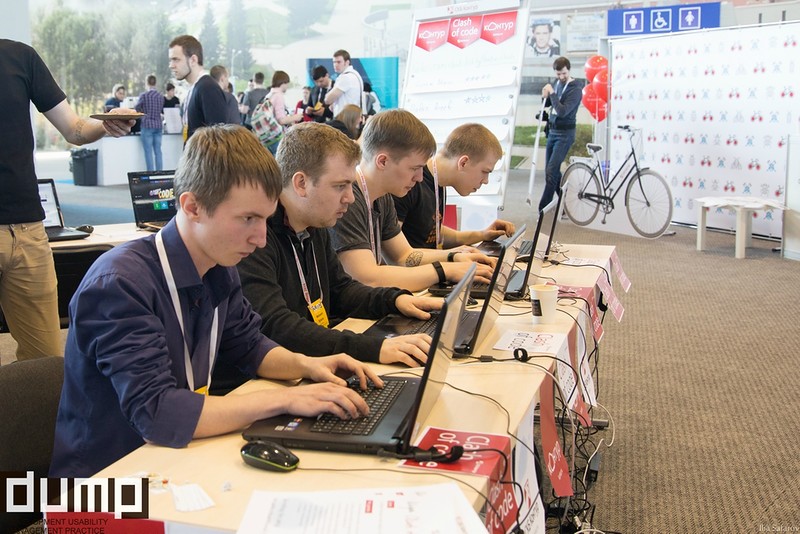
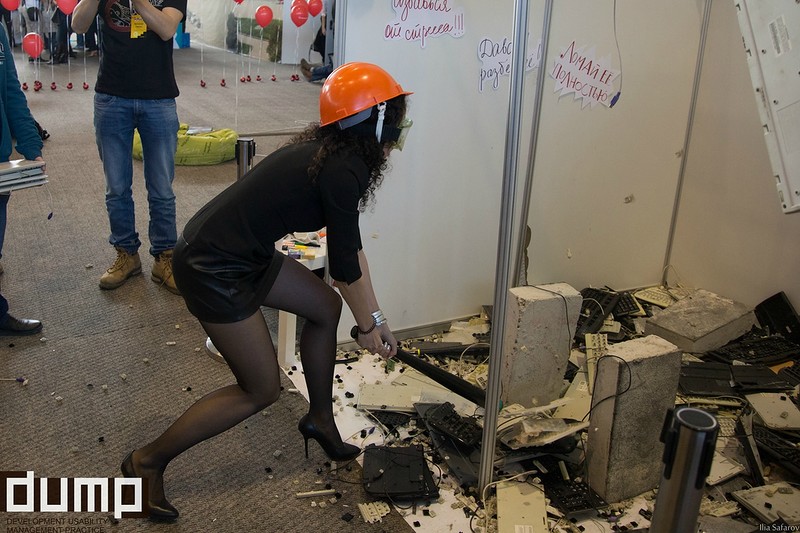
Olka Shikhova @ vampironok666
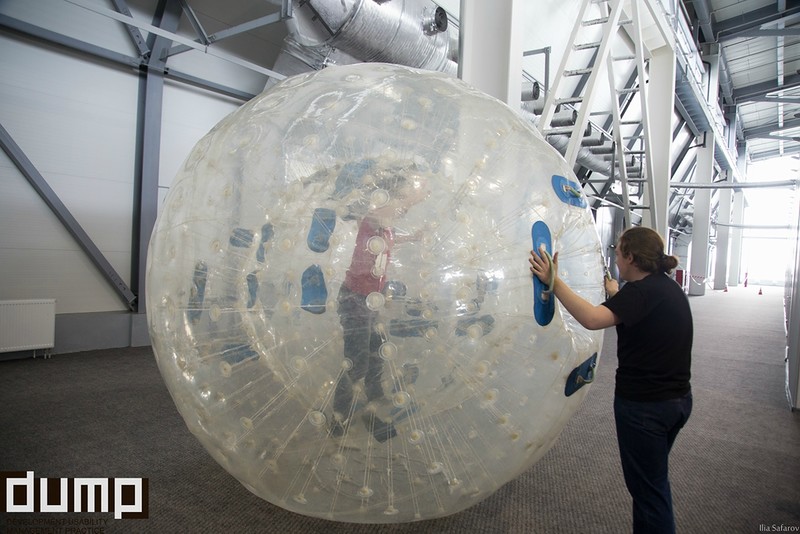
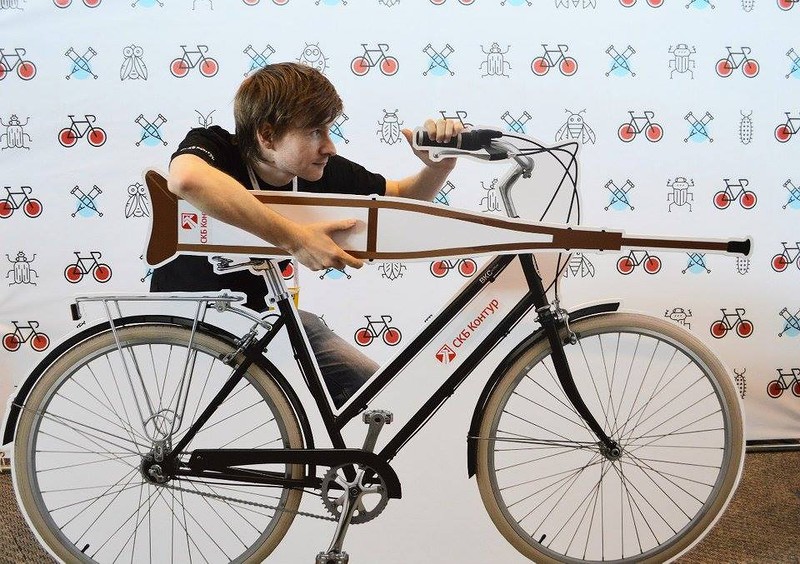
More photos from the photo zone are here.
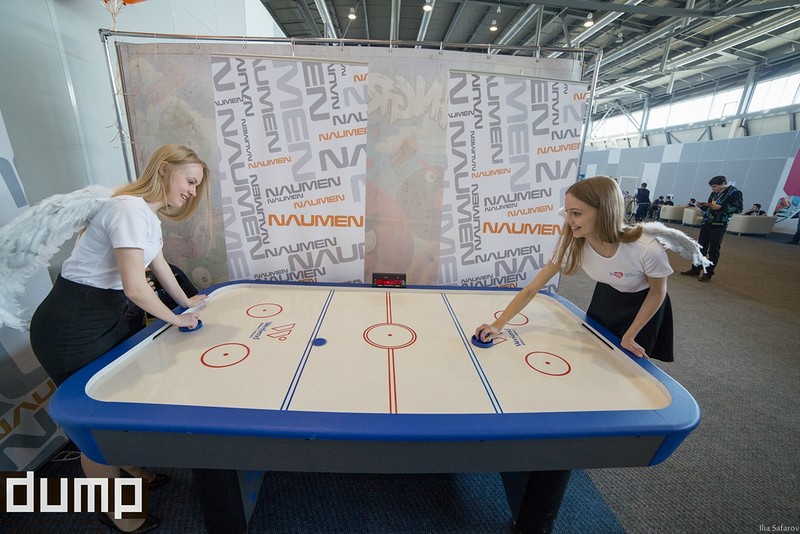
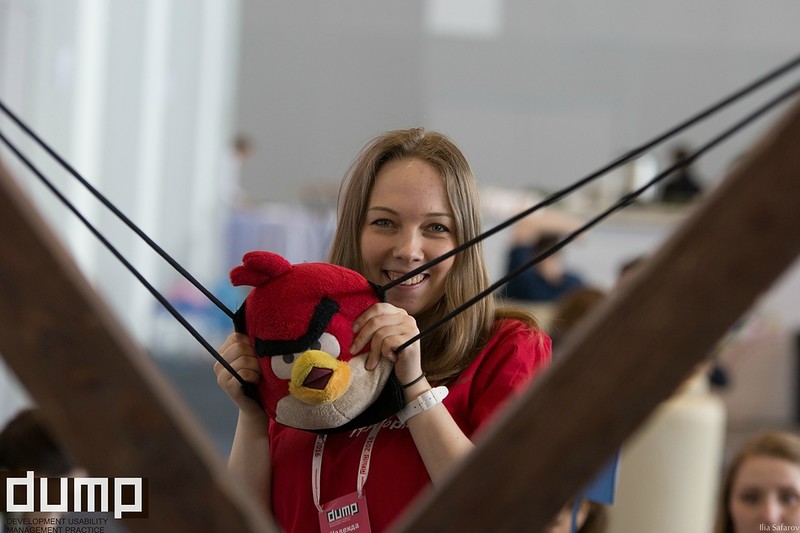

Alexander Plesovskikh @hgenru
All videos are posted on our channel .
You can also watch presentations and photos .
Thanks to our sponsors who make the conference possible: SKB Kontur , IT Center , Naumen .
And on July 3-4 we are hosting the fourth PyCon Russia - again in nature, again with foreign speakers, again in a warm atmosphere, but now not far from Moscow. Join now! The preliminary program is ready.
Reports were made in 7 sections: FrontTalks, Serverside, Mobile, Web-design, DevOps, Testing, Management.
')
Special thanks to the program committee for their tremendous work. Thank you for all that you have done to make DUMP interesting and useful! So, here's what we got.
FrontTalks section
Web evangelist at Opera Software , Web Standards project leader Vadim Makeev (St. Petersburg) told about the grid and showed examples of use for real-world tasks.
Yandex lead frontend developer Alex Androsov (Moscow) spoke about React-native - a new framework for developing cross-platform applications for iOS and Android.
Anton Shuvalov from Lazada (Moscow), explained how bad console.log is, and how to save time debugging in Dev Tools. He also told how to use breakpoints, monitor the state of stacks, variables and expressions, walk through the most confusing source codes with code cards and catch tricky exceptions.
Vitaly Zyuzin , course developer and tutor at HTML Academy (St. Petersburg), told how to understand if there is a bug in your browser, how to help browser developers catch and fix it, but for now this happy event did not happen, how to try to get around the error.
Vladimir Grinenko from Yandex (Simferopol) spoke about BEM without bem-tools. And even without ENB, EUI.
Avito frontend developer Roman Dvornov (Moscow) spoke about the principles of CSSO, new ideas for optimizations and changes in recent releases.
Sergey Zhigalov from Yandex showed how to start writing tests, what tools and techniques you can use, and shared his own experience in developing JavaScript tests.
The most unusual report was made by Alexander Zavyalov from Yandex . He spoke about the impact of sports on our lives and work. Viewing the report gives +10 press.
lubopitnii_psih
Sasha Zavyalov sells on # dump herbolife, oh that is, sports :))
Serverside section
The CEO of Postgres Professional , a member of the PostgreSQL Foundation, Oleg Bartunov (Moscow) made a report on the trends in PostgreSQL, the new features of the latest and expected versions. And for those who report a little, watch the video of a separate meeting of Oleg with fans of PostgreSQL.
Swarm.js author Victor Grishchenko explained why Swarm (a database on a partially ordered log and CRDT types that provides caching, synchronization, and work offline, on the client and the server) is the “upside-down database”.
@astro_nom_
At #dump, gritzko talked about the complicated: how to synchronize data so as not to break the spears on the rake. Waiting for #swarmjs
Few who have managed hundreds of servers, most likely one, two or three. And how to make them work? How to ensure high load capacity, if you do not have in the state of Igor Sysoev? Oleg Bunin , General Director of Ontiko (Moscow) high-development Internet projects development studio and organizer of conferences for web developers HighLoad and RIT ++, told about this.
From the report of Ivan Nemytchenko (Belgrade), an evangelist at Gitlab , you will learn that GitLab is not only hosting for git repositories for a long time, but a real open source (and still free!) “Food processor”. It can be used in the cloud and on your hardware, you can use CI for private projects and many other cool things that greatly accelerate and cheapen the development of projects.
And on April 9, Ivan spent Lean Poker - a mixture of hackathon and workshop, whose task is to write a bot to play poker. Commands on php, python and c # competed. Guess who won? Here are photos from poker. Vanya, thanks again for the unusual cool format!
If you are waiting for Java 9, then the next report is for you. Head of the prototyping department at the IT Center, Sergey Petunin, shared the results of the preparation of the new sjavac compiler and tried to answer the question “how clever is the smart compiler in Java 9?”
Alexander Denisov from Naumen told about the features of software localization, and Andrei Arkaev - about using json / xml in PostgreSQL and Oracle databases for storing arbitrary attributes.
Ruslan Talipov (findmeals.com) clearly and intelligibly explained what Transfer Learning is , and told how, why and with what tools to use neural networks in your projects, even if you are not a Yandex.Music developer.
Igor Chevdar ( SKB Kontur ) spoke about the use of automatically generated code for a non-obvious goal - application optimization.
Mobile Section
Denis Neklyudov , an Android development expert with the status of Google Developer Expert (Moscow), spoke about the realities of clean architecture in a large legacy project, Espresso tests, using Dependency Injection testing, integrating the testing process into daily development, and about all the pitfalls about which can be broken forehead more than once. Want to learn from the mistakes of others - be sure to look.
The official Google expert, the head of the Android development team at RedMadRobot (Moscow), Maxim Efimov, explained what the Java Memory Model is, explained what nuances are expected of the developer when writing multi-threaded code, and how to take this into account in Android applications. Pay attention if you are interested in multithreading in mobile development.
Alexander Sychev, iOS development engineer at Rambler & Co, in his report showed and told how to solve the problem of controlling a complex object with a multitude of internal states using such an abstraction as a finite automaton.
Alexander Smirnov ( RedMadRobot , Moscow) gave a useful report on what you need to know about the security of a mobile developer: the Android security model, key vulnerabilities and ways to protect against them.
Are you thinking of using Xamarin or is it better to choose another way of mobile development? Then the report of Dmitry Moiseev ( SKB Kontur ) is for you.
Android developer at Rambler & Co Andrei Melnikov (Moscow) told all about caching in android: basic types and models of caches, where and how you can embed the cache, which tools will help you quickly and painlessly organize or improve caching, how this problem is solved in Rambler & Co.
Alexey Vasilyev , responsible for developing the Yandex.Store backend and some other mobile projects, figured out who and why needed tracking.
The next report is for the curious. Nikita Ilyasov ( Yandex.Taxi , Moscow) considered another way to transfer data between devices - through sound. Nikita told about the basic principles of the implementation of this method on the example of the implementation for the iOS application and how to do it in Android.
DevOps Section
Danila Shtan , the ex-head of the development department of E96.ru , told how a productive environment was arranged in E96.ru, and how they learned to live without sysadmins.
Maxim Glekov ( Mail.Ru Group , Moscow) explained how Mail.ru release engineering was arranged from within.
Leading 2GIS developer Denis Yakovlev (Novosibirsk) spoke about the problems with the infrastructure faced by their teams, about the implementation of OpenStack and how automation has affected the development of the entire business.
Ivan Kokorin ( Vostok Projects ) on practical experience of scaling in the Amazon cloud using Auto Scaling, Spot Instances, boto, anisble and zabbix, told how to scale in the cloud and save the company's budget.
Want to sleep at night, knowing that the robots are following the metrics? You will find the report by Alexey Larkov from the SKB Kontur about Moira, a monitoring system based on data sent to Graphite, useful.
Andrei Khitrin ( Naumen ) spoke about his experience in crafting a crafting framework for stress testing. SIP, RTP, HTTP, distribution, small services, large services and healthy databases - that’s all.
Alexander Kazakov ( SKB Kontur ) told how distributed applications are profiled in Kontur.
How to spend one hour a week servicing a cluster of 1000 servers? Alexander Bersenyev from the Institute of Mathematics and Mechanics of the Ural Branch of the Russian Academy of Sciences does just that. From the report you will learn how to automate the execution of typical operations on groups of nodes: OS installation; software setup and bios / efi; troubleshooting. And what to do if you inadvertently put the network on several hundred nodes.
Alexander Kirillov ( Evrone , Saratov) told who and why uses continuous integration in everyday software development and what problems it solves. And also: how the services of continuous integration are arranged, how they differ from each other, with what type of projects you can work there.
Management Section
An analyst from 2GIS Ignat Anikeev (Novosibirsk) told about the metrics that they track at 2gis.ru (by the way, more than 13 million unique users visit the site per month).
Maxim Ahmadinurov , a scrum master of development and a quality specialist at Button , taught how to use Google Docs to quickly and clearly make simple and understandable metrics that will change the life of a company.
Julia @yulia_ekb
At # DAMP for the first time talked about metrics in @KnopkaCom. They help to make cool service - everything is transparent and real-time.
Boris Dyakonov , the head of Point , the vice-president of Otkritie Bank, the founder of Bank24.ru, made one of the most incendiary reports. Boris spoke about the pros and cons of the traditional approach to metrics and kpi, suggested their alternative use, and also shared a universal criterion for the potential usefulness of metrics.
Daria Ryzhkova ( Octoberry, Scrumtrek, Moscow) explained why $ never become a product metric.
Using the example of Naumen Contact Center, Andrey Zaitsev ( Naumen ) explained how to develop a product by competing with world monsters.
Sergey Bobin ( Arnica, Dent ) taught how to measure and increase the value of the product for the user.
Alexander Ustinov, Founder & CEO at BeaversBrothers, looked at the work of the agency from the client’s side and explained how to work and how not to work.
Alexander Karabasov from Abak Press told a fascinating case from personal experience “How to get two programmers from a hundred taxi drivers”.
Alexander Golubev , development manager of the SKB Kontur Certification Center, shared his experience on how their team adapted after the dismissal of employees: how they overcame panic, restructured the processes in the team, and what happened in the end.
Arthur Kuzyakov ( DriverPack , Moscow) taught how to choose an effective strategy for the growth of an IT startup.
Section Testing
The head of the Parallels automatic testing team, Vasily Nikishin (Tallinn), using the example of Parallels, told how to create a self-testing team in unusual conditions.
Andrey Usov , testing specialist at 2GIS , told how to test the network part of the mobile application correctly.
Kirill Ratkin ( SKB Kontur ) taught how to plan the development of autotests.
Andrey Hitrin @ahitrin
Autotest planning is like family planning. Or do you do this, or do you get unexpected nezhdanchik # dump
Yevgeny Sabirov ( Khost ) spoke about the criteria for a good test infrastructure, as well as how he manages to spend almost no time on supporting autotests.
Andrei Malykh from Abak Press spoke about testing automation using Appium and Cucumber.
What can unite a professional community so that it does not disintegrate after some time, but has existed for years? Anastasia Ronzhina from SKB Kontur, together with colleagues from other companies, tried to answer this question at a round table.
Artyom Aksyonov from ITM Holding explained how to survive the testing department in the changing conditions of the coexistence of Waterfall and Scrum.
Web design section
Ekaterina Akatova from Mail.Ru Group (Moscow) told how to test a product without a laboratory: methods, tools, limitations and advantages of remote research.
Yaroslav Shuvaev , product owner Alfa-Mobile at Alfa-Bank, curator of the UX & UI Intensive in the British Higher School of Design , on the example of Alfa-Bank's mobile application, very vividly told how to plan and implement improvements to the user experience of the product in a flexible production environment.
UI / UX designer, creative director of the Openlac.Design Bureau, Anatoly Ivanov, shared his experience of working with foreign customers and told them what the pain is.
Andrei Karmatsky , head of the Urbica Design studio (Moscow), described how the process of creating interfaces that work with complex data is structured, how it differs from traditional web interfaces, what needs to be considered when visualizing data, and what tools there are today to start do it.
The author of the course “Typography and Layout” Igor Shtang (Chelyabinsk) told about his own text layout algorithm.
How should a designer change and develop? What skills will be needed in 20 years, and what skills are needed now. The curator of the course “Design of Mobile Applications” at the British Higher School of Design , senior designer at RedMadRobot, Alexander Burdin, based on the experience of the British and Robots, proposed his own plan for improving the interface designer.
JetStyle digital art director Alexey Markin , standing on a mini-segway, told about the non-triviality of introducing VR & AR into everyday life and showed how it looks in reality.
Veronika Lushnikova and Pavel Prikhodko ( BeaversBrothers ) explained why the client might not receive the promise, discussed the ideal process of working on the web product, looked at the problems in transferring the design to the layout and showed how to solve them.
How to survive in the wild conditions of a complex developing product. What to love, what to fight and what to score? Using the example of Ridero.ru (the project is a finalist of the Startup of the Year 2015 Award in the Global Startup nomination), Daria Prokuda was examined . Faced with a complex project or product? Or maybe you are thinking about switching to product design? Then be sure to listen to this report.
tatyankina_a
You just need to figure a lot and not frustrate. @prokudada on #dump #jetstyle
Between presentations
Sponsors did not let the participants get bored during the breaks. SKB Kontur came up with a bunch of activities: the battle of the code, a fun photo zone with crutches and a bicycle, a zorb (!) And the most interesting thing is the opportunity to crush the keyboard with a bat. The IT Center served coffee and conducted an online quest. Naumen entertained the participants in the playing area with table hockey and huge evil birds.

Clash of code

Olka Shikhova @ vampironok666
Antistress was clearly needed) More than 20 keyboards were broken, the desk ... and even the hammer and bits were broken)
# dump # SKBContour

Did you ride the zorb at the conference?

More photos from the photo zone are here.

We know for sure that there are no cowards among IT specialists

Aiming for #dump 2017

Alexander Plesovskikh @hgenru
Seals have become a tradition # dump
Materials
All videos are posted on our channel .
You can also watch presentations and photos .
Thanks
Thanks to our sponsors who make the conference possible: SKB Kontur , IT Center , Naumen .
And on July 3-4 we are hosting the fourth PyCon Russia - again in nature, again with foreign speakers, again in a warm atmosphere, but now not far from Moscow. Join now! The preliminary program is ready.
Source: https://habr.com/ru/post/302286/
All Articles